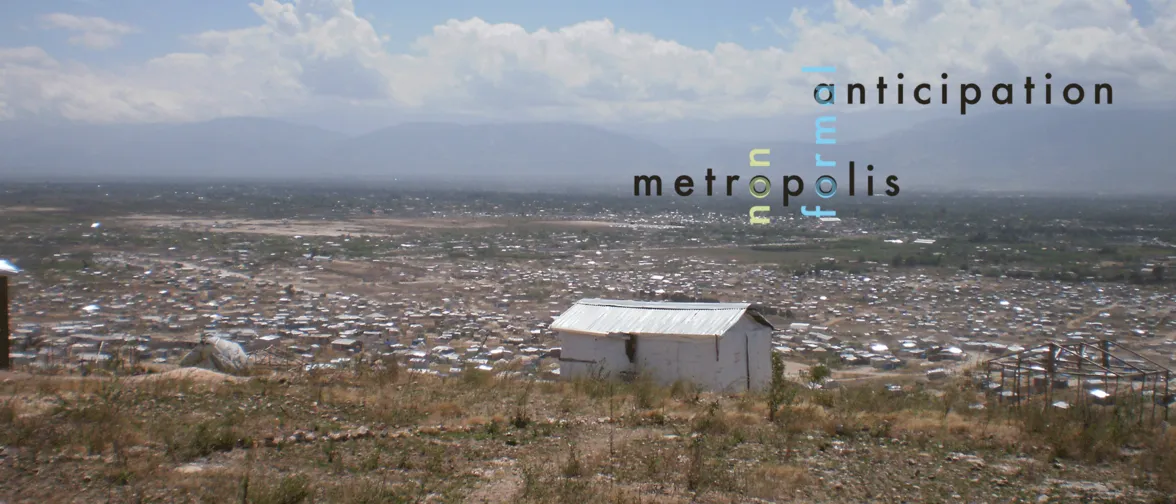
Metropolis nonformal
Anticipation
Symposium launching the UN-Habitat Hub on Informal Urbanism, Sophiensaal, Sophienstr. 6, Munich
20. - 23. November 2013
Description
Informal urbanism is one of the dominant forces driving urban growth in cities in the developing world. During the last half-century a range of interventions were developed to improve the living conditions of existing informal neighborhoods. Less clear, however, are viable strategies for the additional projected two billion ‘slum’ dwellers by 2050. Policy makers mostly focus on the infrastructural deficiencies and illegal status of informal urbanization. In contrast, Metropolis Nonformal – Anticipation operates under the realization that self-construction is in many countries the only viable urbanization model for low-income migrants. Metropolis Nonformal – Anticipation insists that cities must shift from a negative attitude of prevention to a more positive attitude of anticipation and assistance to growing numbers of informal settlers.
The symposium explored anticipatory strategies that actively integrate the entrepreneurial capacity and intelligence of low-income migrants in the production of future urban growth. Are there alternative land ownership and land allocation models that can provide buildable sites? What is the urban form and framework of managed self-construction? How does one communicate with urban migrants in waiting, in transition or recently arrived? Can self-built holistic and resourceful infrastructures be deployed to foster water management, close food-waste cycles, provide building material, offer transport solutions, mitigate unsafe sites and ultimately generate income and jobs?
Metropolis Nonformal served as the launching event of a new ‘Hub on Informal Urbanism’ as part of the Habitat Partner University Initiative (HPUI).
[Translate to en:]
| 09:00 | Introduction | |
| Regine Keller: Welcome by the vice president of TUM?Christian Werthmann: Metropolis Nonformal - Landscape, Infrastructure and Urbanism in the Global South | ||
| 09:30 | Community | |
| Phillip Thompson: Participation and Social Engineering Flavio Janches: Whose City is it? Design Strategies for Marginalized Communities in Buenos Aires?Moderator: Hubert Klumpner | ||
| 11:30 | Productivity | |
| Gabriel Duarte: Angolan and Brazilian Favelas Arthur Adeya: Productive Public Space in Kibera, Nairobi Moderator: Phillip Thompson | ||
| 13:00 | Lunch Break | |
| 14:00 | Fluidity | |
| Fernando de Mello Franco: Watery Voids, São Paulo Anuradha Mathur: SOAK, Mumbai Moderator: Gabriel Duarte | ||
| 16:00 | Mobility | |
| Hubert Klumpner: Scaling Caracas’ Magic Mountain Alejandro Echeverri: Transportation, Education and Public Space in Medellin Moderator: Fernando de Mello Franco | ||
| 17:30 | Final | |
| Oliver Heiss, Werner Lang, Regine Keller, Udo Weilacher, Sophie Wolfrum Moderator: Christian Werthmann | ||
| 18:30 | Farewell, Get-Together
|
Curator
Christian Werthmann,
TUM-IAS Hans Fischer Senior Fellow (TUM Institute for Advanced Study),
Professor of Landscape Architecture and Design, Leibniz University Hannover
Hosted by:
Regine Keller, TUM in collaboration with UN-Habitat
Supported by
UN-Habitat – Claudio Acioly Jr., Head Capacity Development Unit, Housing & Urban Management Expert
TUM Institute for Advanced Study (TUM-IAS) – Director Gerhard Abstreiter
International Center, TUM
DFG - Deutsche Forschungsgemeinschaft
TUM Graduate School - Graduate Center Architecture
Bayerische Architektenkammer
CAD-Solutions – Graphisoft
Bruns Pflanzen-Export GmbH & Co. KG
Südhausbau KG
Organisation
Juliane Schneegans, coordinator of the symposium
Sigrid Wagner, event manager/web coordinator of TUM-IAS
Tatjana Steinberger, program manager of TUM-IAS
Asa Isacson, UN Habitat
Christina Milos, Leibniz University Hannover
Publication
Nonformal urbanization will be the dominant mode of urban growth in the coming decades. The results of this growth go by many well-known names, including: slums, favelas, and shantytowns. The precarious conditions of these settlements, excluded from formal legal, social, and infrastructural systems, present a central challenge—and opportunity—in our current and future cities. Short texts explain a range of projects and initiatives, complimented by photographs and personal insights, to present a diversity of responses to the global phenomenon known here as “Metropolis Nonformal”.
Metropolis Nonformal
Christian Werthmann and Jessica Bridger
ORO Applied Research + Design, 2016
240 Seiten
Englisch
ISBN 978-1-940743-14-1
Video Documentation
More Videos on vimeo